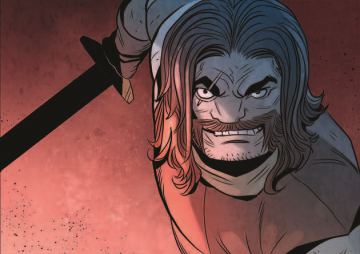Difference between revisions of "Cawdor"
(→Real World Background) |
Phoenician (talk | contribs) |
||
| Line 4: | Line 4: | ||
==History== | ==History== | ||
In [[Timeline|971]], Cawdor slew [[Verity|"Verity"]] by stabbing her in the back. Before he could do the same to [[Hudson|Mentor]], the leader of the [[Wyvern Clan]] swiftly and brutally avenged his mate. | In [[Timeline|971]], Cawdor slew [[Verity|"Verity"]] by stabbing her in the back. Before he could do the same to [[Hudson|Mentor]], the leader of the [[Wyvern Clan]] swiftly and brutally avenged his mate. | ||
| − | |||
| − | |||
| − | |||
| − | |||
==Appearances== | ==Appearances== | ||
*[[The Draw|"The Draw"]] | *[[The Draw|"The Draw"]] | ||
| + | |||
| + | ==Real World Background== | ||
| + | Cawdor was named after the Thane of Cawdor in [[William Shakespeare]]'s ''[[Macbeth (play)|Macbeth]]''. There were two thanes by that title in the play. The first (an off-stage character) sided with [[Duncan]]'s enemies; his treachery was revealed, he was executed, and Duncan bestowed his title upon [[Macbeth]]. The [[Weird Sisters]], when meeting Macbeth before he received the news, hailed him as "Thane of Cawdor" as well as "Thane of Glamis" (the title which he already bore) and "king hereafter". | ||
[[Category:Canon characters]] | [[Category:Canon characters]] | ||
[[Category:Humans]] | [[Category:Humans]] | ||
Revision as of 11:31, 13 August 2023
Cawdor was a retainer to King Culen.
History
In 971, Cawdor slew "Verity" by stabbing her in the back. Before he could do the same to Mentor, the leader of the Wyvern Clan swiftly and brutally avenged his mate.
Appearances
Real World Background
Cawdor was named after the Thane of Cawdor in William Shakespeare's Macbeth. There were two thanes by that title in the play. The first (an off-stage character) sided with Duncan's enemies; his treachery was revealed, he was executed, and Duncan bestowed his title upon Macbeth. The Weird Sisters, when meeting Macbeth before he received the news, hailed him as "Thane of Cawdor" as well as "Thane of Glamis" (the title which he already bore) and "king hereafter".
